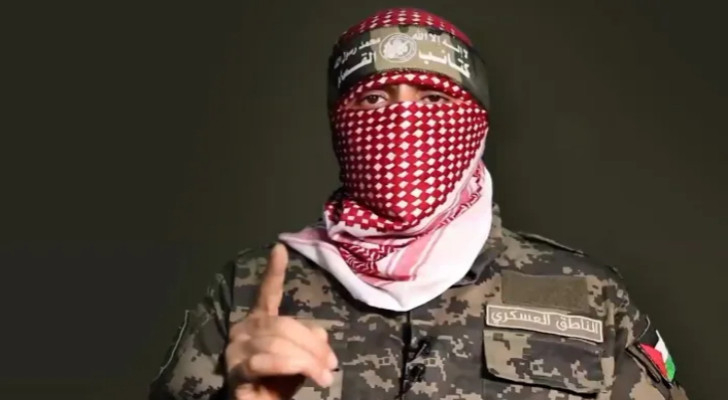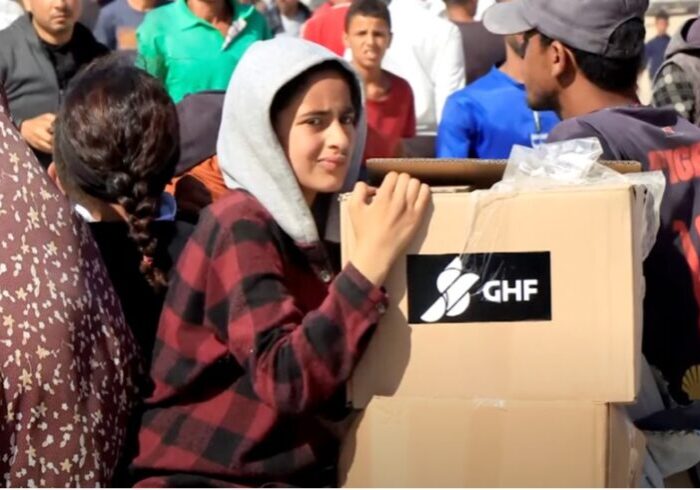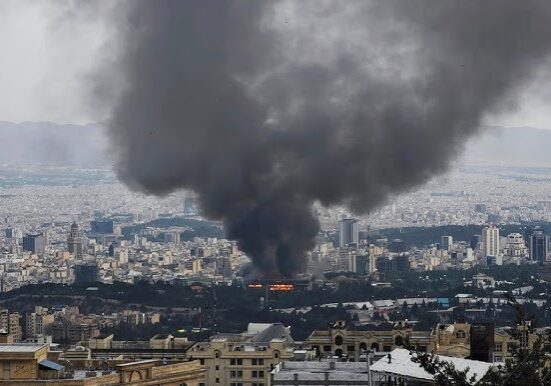Australia/Israel Review
Essay: The Face of Hamas
Mar 27, 2024 | Rany Ballout

Spokesperson “Abu Obaida” resonates across the Arab world
“Abu Obaida” is the nom de guerre of the military spokesman of the al-Qassam Brigades, the armed wing of Hamas. Clad in a green military uniform and a red keffiyeh, he has regularly appeared on TV screens throughout the Middle East, providing updates on Hamas’ war effort and related political developments since October 7. In short speeches delivered with a defiant tone, he announces Hamas’ purported tactical achievements and consequential losses for Israel while promising an imminent victory.
According to media reports, the persona’s first public appearance as al-Qassam’s military spokesman can be traced back to the 2006 Gaza-Israel conflict. The Israel Defence Forces (IDF) said in October 2023 that his real name is Hudhayfah Kahlout, with Israeli media further reporting that his hometown is the village of Naliya in Gaza. Neither Hamas nor al-Qassam has commented on the matter.
Since October 7, Abu Obaida has gained massive popularity and traction across the Arab and Muslim world. The hype around Abu Obaida’s broadcast speeches is vast, with prolific commentary and reactions largely praising him as a saviour, with thousands of captions across the web. Arab social media depicts people, including children, glued to TV screens awaiting his speeches.
Large banners featuring his picture appear in many Arab and Muslim states and cities, such as Beirut, Turkey, and Jordan. His banners have also appeared in soccer stadiums in Tunisia and Libya, and his image has even been featured in a tifo display [A choreographed display in which large groups of sports fans hold up signs or banners in the stands of a stadium- Ed.] by a prominent soccer team in Algeria. As a result, large segments of the Arab and Muslim population embraced Hamas’ information war against Israel, celebrating the October 7 assault as a major military breakthrough.
Remarkably, Arab and Muslim artists, actors, and even academics have expressed their admiration and support for Abu Obaida as a symbol of Palestinian resistance. One Syrian actress described how she preferred to listen to Abu Obaida’s voice in the morning over Lebanese singing icon Fairuz. Egyptian actor Mohamed Ramadan said he would be featuring the character of Abu Obaida in a future drama in response to Israeli media’s call to boycott his dramatic work.
On X, a post showing an exam paper with questions regarding him and Hamas’ purported achievements in the Gaza war went viral. More seriously, news media reporting on his popularity included coverage of children in Algeria and Palestinian camps in Lebanon emulating him as a role model, impersonating his gestures while wearing military outfits and keffiyehs.
Arab Media Coverage
In the first hours and days after the October 7 attacks, recorded statements, posts, or videos of Abu Obaida started appearing on several TV channels, networks of pro-Hamas online news media, and Telegram channels, underscoring Hamas’ focus on reaching a mass audience and controlling the narrative of the war with Israel through social media. Abu Obaida’s statements have since been accompanied by highly sophisticated footage released on Telegram showing Hamas combatants battling Israeli forces in Gaza. Abu Obaida’s recordings first appeared on Gaza-based Hamas-affiliated Al-Aqsa TV and several Hamas-linked Telegram channels. These Telegram channels have played a significant role in propagating Hamas’ narrative. Although Al-Aqsa TV and several Hamas-linked Telegram channels have been banned, research highlights the role it has played in propagating Hamas’ war narrative, helping to foster audience engagement.
Not surprisingly, Al Jazeera has been the leading Arabic mainstream media in promoting Abu Obaida’s campaign. It has picked up Abu Obaida’s recorded statements aired simultaneously by Al-Aqsa TV and has also been broadcasting his speeches in their entirety. Beyond live broadcasting, Abu Obaida’s series of recorded videos often appear with sensational headlines designed to glorify him as a resistance hero. Al Jazeera’s broadcasting is also compounded by press coverage exalting Obaida. For instance, one flattering article titled “Abu Obaida: The True Voice in an Era Marked by False Images,” depicted him as a selfless figure with unprecedented popularity in the Arab world as a result of not only his communication skills but also his objectivity in accounting for developments on the field.
Other Arabic mainstream news channels, such as the Qatari-based Al Araby TV and Lebanon-based, Iranian-aligned Al Mayadeen, also propagate Abu Obaida’s speeches and Hamas’ war narrative. In addition to regularly broadcasting his speeches accompanied by favourable press articles, Al Araby journalists have produced several promotional videos of Abu Obaida, describing him as a resistance symbol.
Al Mayadeen, for its part, has seized the opportunity to engage in pro-Hamas psychological warfare since the early hours of Hamas’ operation. This includes fully broadcasting Abu Obaida’s speeches and propagandistic press articles. A highly sophisticated propagandistic video titled “Who is Abu Obaida?” glorifies him as the voice of resistance and the inspirer of Arabs’ hearts, deploying highly charged Arabic poetic prose against the backdrop of dramatic soundtracks.
Generally speaking, Hamas’ war narrative has found a home in much of Arabic news media, and its messaging has been readily amplified to reach a large audience in the Middle East.
Illusory Hopes of Victory
Most notably, the speeches themselves remain fundamentally religious. The speeches predominantly frame the conflict between Palestinians and Israelis as a historical and perennial conflict between Islam and Judaism, situating it in the context of what Abu Obaida calls the “law of the jungle” (a reference to the Western-led world order) that is oblivious to the Palestinian cause and rife with antagonism towards Arabs and Muslims. Its strongest arguments often refer to the purportedly imminent demise of the Jewish state, with the “Al-Aqsa Flood” operation of October 7 beginning the decisive era of Israeli defeats.
The speeches relentlessly call on Arabs and Muslims in neighbouring countries to wage total war against Israel in support of Hamas or to mobilise in regionwide protests against Israel’s war. The speeches weave familiar Palestinian national resistance vocabulary with religious concepts such as “the Arabic and Islamic Umma [nation],” “Mujahidin”, and “jihad until the judgment day,” among others. In particular, Obaida extensively quotes martial verses from the Quran. The speeches are also part of Hamas’ media campaign to cope with real-time developments on the field, reflecting their awareness that their media campaign is no less important than their military effort.
Despite the immense destruction, human toll, and suffering in Gaza, Hamas depicts an effective and victorious battle against Israel. While it is true that Hamas has succeeded in sustaining combat operations, strategically speaking, there exists no balance of power between Hamas and Israel, given Israel’s unmatched military superiority backed by a highly developed economic power.
More consequential is the enormous and long-lasting deterioration of the Palestinians’ living conditions caused by the war, with large swaths of Gaza becoming uninhabitable and the displacement of the vast majority of Palestinians.
As argued above, most Arabic media and a majority of the Arab public appear to have subscribed to Hamas’ war narrative against Israel. With the absence of constructive discussions and debate over the strategic state of the war, the conflict is incorrectly described as one between equal powers. Claims include Hamas having killed substantial numbers of Israeli forces, destroying hundreds of tanks and weapons, an Israeli economy suffering as a result of reservist mobilisation, and a political divide tearing Israeli society apart.
Israel’s massive military response to the Hamas assault and the ensuing large-scale war destruction has not deterred a majority of Arabs from across various political currents from entertaining sentimental appeals to illusory promises of victory. Yet, the Arabic media’s focus on Hamas’ purported warfare is hardly surprising and replicates similar delusional portrayals of the previous Arab-Israeli conflicts since the 1950s, ensuring Arab defeats create public despair and anger.
Instead of engaging and presenting a sound assessment of the Israeli-Palestinian conflict and the broad Arab-Israeli conflict, most of the Arabic media contributes to feeding a distorted view of the current conflict – except for the conveying of the suffering of Gazan civilians – at the expense of sound political and strategic assessments.
Rany Ballout is a New York-based political risk and due diligence analyst with extensive experience in the Middle East. He holds a master’s degree in International Studies from the University of Montreal in Canada and a bachelor’s degree in Linguistics from Uppsala University in Sweden. © The National Interest (www. nationalinterest.org), reprinted by permission, all rights reserved.
Tags: Hamas, Middle East






